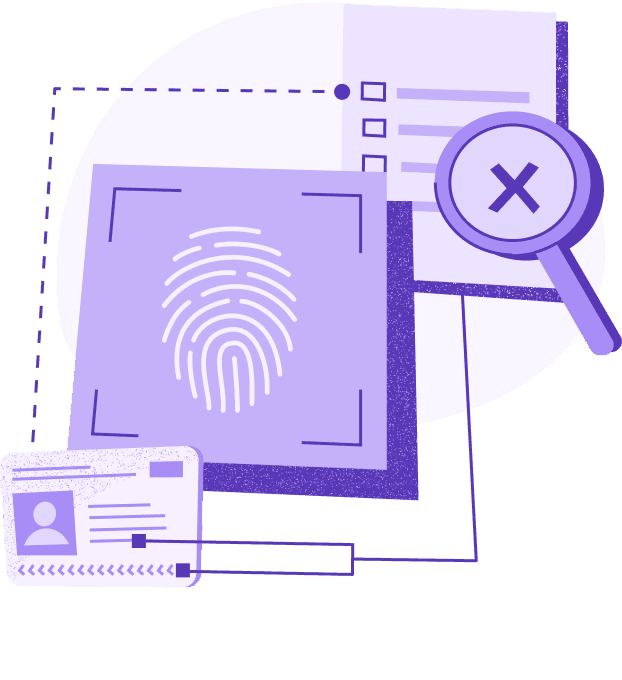Article
5 min read
A Guide to Employee Background Checks in Peru
Employee background checks
Legal & compliance

Author
Michał Kowalewski
Last Update
September 05, 2025

Table of Contents
Essential information for a background check in Peru
Are background checks legal in Peru?
What types of background checks are illegal in Peru?
Common background check Industries in Peru
Types of employee background checks in Peru
Background check mistakes to avoid in Peru
Step-by-step guide to employee background checks in Peru
Key takeaways
- Background checks are legal and common in Peru, but require following data privacy laws. This includes obtaining consent, respecting data limitations, and avoiding discrimination
- Common background checks in Peru include verifying criminal records, employment history, and education. Social media screening is also increasingly common, while credit checks are less frequent
- To conduct legal and effective background checks, follow a step-by-step process. This includes obtaining consent, verifying identity, checking relevant information, and storing data securely
Employee background checks should be an integral part of your hiring process in Peru. Although not mandatory, they are a common practice, especially in finance, healthcare, education, security, transportation, logistics, and public sector.
Employee background checks should be an integral part of your hiring process in Peru. Although not mandatory, they are a common practice, especially in finance, healthcare, education, security, transportation, logistics, and public sector.
Peru is recognized for its growing economy, strong level of English proficiency, competitive labor costs, and developing talent pool. These factors contribute to a conducive environment for businesses, making it an attractive place for hiring. Background checks in such a dynamic market are important to ensure the reliability and integrity of hires, especially in sectors driving economic growth.
In this article, you will discover:
- How to run an effective and legal employment screening in Peru
- What are the common types of employee checks in Peru
- Step-by-step process of a thorough employee screening
- What mistakes to avoid when performing a background check in Peru
Essential information for a background check in Peru
An employee background check is the process of verifying a potential hire’s work history, education, professional qualifications, and any criminal records they might have. It’s particularly beneficial to run before finalizing an employment offer or signing a contract, ensuring the candidate meets the company's standards and requirements.
In Peru, employee background checks are governed by the Personal Data Protection Law (Law No. 29733), Ministry of Justice and Human Rights (MINJUSDH), and the National Authority for the Protection of Personal Data (NDPA).
- Personal Data Protection Law (Law No. 29733): This law governs the collection, use, and storage of personal data, including information obtained through background checks. It emphasizes transparency, informed consent, and limitations on data collection.
- Ministry of Justice and Human Rights (MINJUSDH): This ministry acts as the governing body for the Personal Data Protection Law, establishing policies and regulations for its implementation.
- National Authority for the Protection of Personal Data (NDPA): This entity falls under the Ministry of Justice and Human Rights. It oversees the enforcement of data protection regulations, provides guidance to organizations, and resolves data protection-related disputes.
Are background checks legal in Peru?
Yes, background checks are legal in Peru, provided they are conducted in compliance with the Personal Data Protection Law. Employers have the right to request and verify information relevant to a candidate's suitability for a position, including employment history, educational qualifications, and criminal records.
However, it's important to:
- Ensure transparency: Inform candidates about the background check process beforehand and outline the specific type of information that will be verified
- Respect cultural context: Be mindful of cultural norms and avoid practices that might be considered intrusive or unethical in Peru
Following these guidelines helps ensure both legal compliance and ethical considerations when conducting background checks in Peru.
Background checks
What types of background checks are illegal in Peru?
Peru’s job market offers exciting opportunities for global tech companies, but running legal background checks requires caution. While verifying qualifications and experience is encouraged, certain practices cross legal and ethical boundaries.
Global employers should be mindful of:
- Obtaining explicit consent: Always obtain written consent from candidates before initiating any background checks. This ensures transparency and respects individual privacy rights.
- Respecting data privacy limitations: Avoid collecting excessive personal data or data beyond what's necessary for the job role. Peruvian data protection laws strictly regulate what information can be collected and used.
- Avoiding discriminatory practices: Background checks shouldn't be used to discriminate against candidates based on protected characteristics like race, religion, or age.
- Ensuring data security: Implement appropriate safeguards to protect the confidentiality and security of collected personal data. This minimizes the risk of data breaches and protects individual privacy.
Peru enforces data privacy strictly, with fines for violations ranging from 0.5 to 100 Tax Units (UITs), translating to approximately $568 to $113,550 USD in 2024 depending on the severity. These violations can include collecting data without consent, failing to secure personal data, or sharing it unauthorized.
Common background check Industries in Peru
In Peru, background checks are prevalent across various industries, with particular emphasis in sectors where trust, safety, and regulatory compliance are paramount. Some of the common industries where background checks are widely utilized include:
- Financial services: Given the sensitive nature of financial transactions and the need for trustworthiness, background checks are common in the financial services industry
- Healthcare: Healthcare organizations conduct thorough background checks to ensure the safety of patients and the integrity of the healthcare environment
- Education: Educational institutions prioritize background checks to ensure the safety and well-being of students and staff members
- Transportation and logistics: Background checks are essential in the transportation and logistics sector to verify the reliability and trustworthiness of employees who handle goods and operate vehicles
- Government and public sector: Given the public trust associated with government roles, background checks are standard practice to assess the integrity and reliability of candidates
Types of employee background checks in Peru
Effective employment screening in Peru covers essential aspects to evaluate a candidate's abilities. Knowing these areas helps employers tailor screening processes to meet job requirements and legal standards.
| Type of Check | Common in Peru? | Reason |
|---|---|---|
| Criminal Record Check | Common | Employers routinely conduct criminal record checks to ensure the safety of the workplace and minimize potential risks |
| Employment Verification | Common | This is a common practice across all industries to verify a candidate's work experience and job responsibilities |
| Credit History Check | Less Common | While prevalent in certain industries, such as financial services, credit history checks are less common in other sectors in Peru |
| Academic Qualifications | Common | Ensures the candidate possesses the required education and skills for the role |
| Reference Check | Common | Contacting professional references to validate a candidate's qualifications and character is a standard practice in Peru |
| Social Media Screening | Common | Less common due to privacy considerations and the need to ensure lawful processing of personal data |
| Drug and Alcohol Testing | Less Common | This type of check is less common and is typically limited to industries where safety regulations or public safety concerns necessitate such testing |
Background check mistakes to avoid in Peru
Whether you’re hiring employees or contractors in Peru, there are a few things you shouldn’t do as an employer when it comes to background checks:
- Failing to obtain consent: Initiating a background check without obtaining explicit consent from the candidate can lead to legal consequences and damage the employer's reputation.
- Violating privacy laws: Collecting or using sensitive personal information that is prohibited by law can result in legal penalties and tarnish the organization's image.
- Neglecting data security: Failing to securely store and protect the information obtained during a background check can lead to data breaches and compromise the privacy of individuals.
- Relying solely on online information: Depending solely on online sources for background checks without verifying the authenticity of the information can lead to inaccuracies and misinterpretations.
Step-by-step guide to employee background checks in Peru
Employers looking to hire in Peru should follow the list of steps below to ensure legal and effective and thorough employee background checks.
- Obtain candidate consent: Before initiating a background check, obtain written consent from the candidate, clearly outlining the purpose and scope of the check
- Verify identity: Verify the candidate's identity using official documents such as a national identification card or passport
- Verify employment history: Request and verify the candidate's employment history, including past positions held, job responsibilities, and reasons for leaving previous roles
- Check educational qualifications: Validate the candidate's educational qualifications with the respective institutions or educational bodies
- Check criminal record: Conduct a criminal record check through authorized channels to ensure the candidate does not have a history of criminal offenses that could pose a risk to the workplace.
- Check credit history: For positions that involve financial responsibilities, conduct a credit history check with the candidate's consent
- Check references: Contact the candidate's professional references to gain insights into their work ethic, skills, and character.
- Check social media: Review the candidate's publicly available social media profiles to assess their professional conduct and suitability for the role.
- Document and store information: Ensure that all obtained information is accurately documented and securely stored in compliance with data protection laws.
- Inform the candidate: Once the background check is complete, communicate the findings to the candidate and allow them to address any discrepancies or provide context for the information obtained
You can also automate this process using Deel, and get a fast employee background check, with results coming in a matter of minutes.
In the past, we've had difficulty finding a background search option for international contractors that 1) is affordable, 2) is easy to use, & 3) gives us the results we need. Deel's new background search add-on was just what we needed & we will continue to use it going forward. Thanks for the fantastic new tool, Deel!
— Mindy Thompson,
Senior Vice President of HR, What If Media Group
Run employee background checks with Deel
There’s no need for HR to log into yet another platform or manually chase documents. With screenings in over 200 countries and territories (and counting), for employees and contractors, you can manage background checks for global hires with a single source of truth without leaving the Deel platform.
Are you looking for an easy and safe way to run a background check? It only takes minutes to get results with Deel.
Compliance

Michał Kowalewski a writer and content manager with 7+ years of experience in digital marketing. He spent most of his professional career working in startups and tech industry. He's a big proponent of remote work considering it not just a professional preference but a lifestyle that enhances productivity and fosters a flexible work environment. He enjoys tackling topics of venture capital, equity, and startup finance.
















